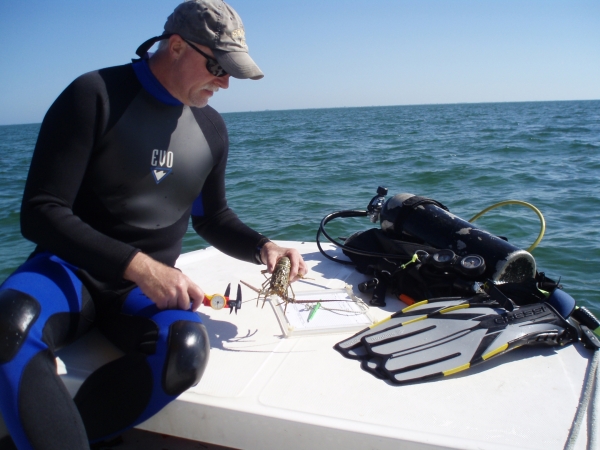Caribbean Fisheries Order Up Butler's 'Pure Science' about Spiny Lobsters
April 23, 2014
Old Dominion University marine biologist Mark Butler has been studying spiny lobsters in the Caribbean for more than 30 years, and has made much-publicized discoveries related to dispersal of populations during the larvae stage and to a viral disease that kills young lobsters. But the conference he was invited to on the island of Dominica in April is not associated with pure science as much as it is with the great value of lobsters as a seafood commodity.
"Spiny lobsters support one of, if not the, most economically important fisheries in the Caribbean - a region comprised of over 35 countries," Butler explained in an email exchange from the Caribbean Regional Fisheries Mechanism (CRFM) meeting he is attending. The CRFM is one of the primary international mechanisms by which Caribbean countries can resolve fishery regulations and policies.
"Whereas much of our research is of a pure science nature and has no obvious immediate utility to fisheries, it often has consequences of interest to fishery management," Butler added. In recent years, Butler's research team has studied two issues of both scientific and fisheries interest: (1) the PaV1 viral disease infecting lobster, on which he has worked with researchers from the University of Florida; and (2) the connectivity of Caribbean lobster populations via the dispersal of planktonic larvae, on which he has worked with researchers from the University of Miami.
"Diseases are as scary for fisheries managers and the fishing community, as they are for the general human population. Yet, natural diseases are even more difficult to control and in some instances have led to the collapse of entire fisheries," said Butler, who is professor and Eminent Scholar in ODU's Department of Biological Sciences.
The implications of the lethal, pathogenic PaV1 disease for lobster fisheries vary with its prevalence. Where common, the disease kills as much as 25 percent of the juvenile lobsters, presenting obvious implications for lobster fisheries. "Our pioneering research on the lobster-PaV1 host-pathogen interaction is providing techniques for the assessment and monitoring of the disease, and is revealing how the disease is transmitted, the environmental features with which it is associated, and its possible interactions and influence on fisheries," Butler explained.
As for Butler's larval dispersal research, spiny lobsters have a planktonic stage that disperses in the Caribbean Sea and the work of Butler and colleagues shows that larvae persist for approximately six months. Thus, populations of lobster around the Caribbean are not single-nation resources. Lobster larvae freely disperse among the Caribbean nation states.
"My research team has partnered with Drs. Claire Paris and Robert Cowen of the University of Miami, whose groundbreaking biophysical modeling techniques can help to predict the complex dispersal of larvae once integrated with detailed biological information for lobsters. When applied to organisms of fishery interest - such as lobster - this research has tremendous application in identifying the multinational partnerships necessary for sustainable management."
Butler was invited to CRFM's Caribbean Fisheries Forum to advise delegates from 17 countries who are concerned about new and emerging challenges, such as climate change adaptation and disaster risk management, and food and nutrition insecurity.
Members stated in a news release announcing the conference that they hope to maximize their initiatives to further drive down poverty rates within fishing communities and improve food and nutrition security, while ensuring that these communities take advantage of modern technological avenues to add dollar-value to the fisheries resources that are a source of livelihood for nearly 200,000 people who fish commercially across the region.


